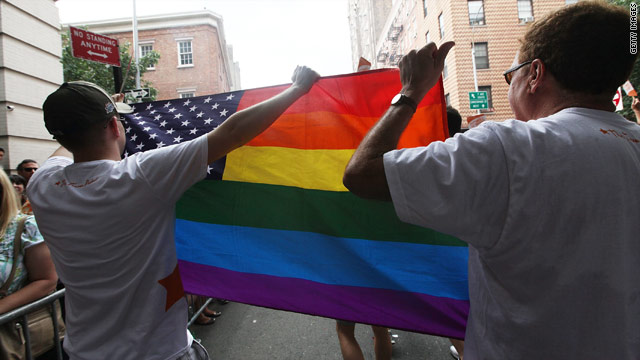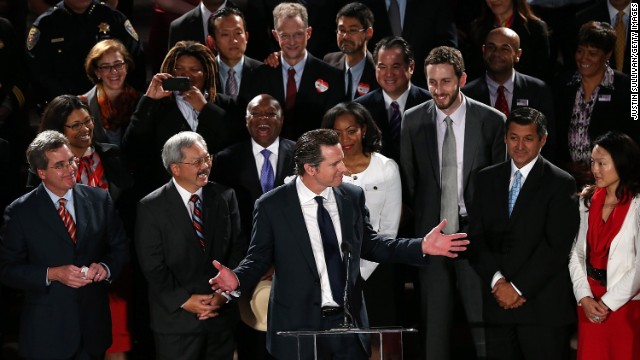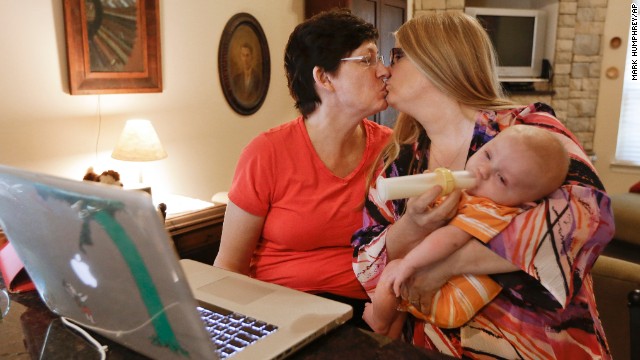DOMA Repeal and the Same-sex Marriage: Good for Business
 Just a few days ago, two new Supreme Court rulings sent shock waves throughout the United States. First, the nine judges voted down a section of the Voting Rights Act, which since 1965 guaranteed that people of different race or ethnicity wouldn’t be unfairly treated at the voting booths, thus ensuring the democratic process was, indeed, democratic. The decision led some political observers to cry foul, comparing it to someone throwing away an umbrella in a storm since they’re not getting wet. But barely a day later, the Supreme Court has voted another piece of legislation down, also a controversial one, but this time in favour of the „radical thinkers”. In what has now become a landmark case, the Supreme Court overturned part of DOMA, the Defense of Marriage Act of 1996, passed by the US Congress during the Clinton administration, potentially levelling the playing field between the heterosexual and same-sex marriages in the US.
Just a few days ago, two new Supreme Court rulings sent shock waves throughout the United States. First, the nine judges voted down a section of the Voting Rights Act, which since 1965 guaranteed that people of different race or ethnicity wouldn’t be unfairly treated at the voting booths, thus ensuring the democratic process was, indeed, democratic. The decision led some political observers to cry foul, comparing it to someone throwing away an umbrella in a storm since they’re not getting wet. But barely a day later, the Supreme Court has voted another piece of legislation down, also a controversial one, but this time in favour of the „radical thinkers”. In what has now become a landmark case, the Supreme Court overturned part of DOMA, the Defense of Marriage Act of 1996, passed by the US Congress during the Clinton administration, potentially levelling the playing field between the heterosexual and same-sex marriages in the US.
 In this particular case, two litigations – one of US v. Windsor and another of Hollingsworth v. Perry – were appealed in District and Second Circuit Courts and pushed all the way up to the Supreme Court, resulting in the SCOTUS’s decision that any laws that made same-sex marriage unequal to the opposing-sex kind were unlawful. The cases were pretty complex, with one of them stemming from the fact that under Californian Law, one woman (Edith Windsor, the plaintiff in the case) was forced to pay estate taxes after her legally married wife (Thea Spyer) had died and left her entire estate to her surviving spouse. The sum of USD 363 053 had to be paid by Mrs. Windsor in full, despite the fact that other married couples were exempt from any taxes following the death of their spouses under the same law. After careful deliberations, the judges decided that this was unlawful and unconstitutional, forcing California to change its law and setting the precedent for all other states in the US to follow. The law in question was Proposition 8, also ruled against in a separate, but similar case earlier. According to Prop 8, passed in 2008, California recognized marriages only between same-sex couples, leading to a multitude of ethical, financial and legal inequalities.
In this particular case, two litigations – one of US v. Windsor and another of Hollingsworth v. Perry – were appealed in District and Second Circuit Courts and pushed all the way up to the Supreme Court, resulting in the SCOTUS’s decision that any laws that made same-sex marriage unequal to the opposing-sex kind were unlawful. The cases were pretty complex, with one of them stemming from the fact that under Californian Law, one woman (Edith Windsor, the plaintiff in the case) was forced to pay estate taxes after her legally married wife (Thea Spyer) had died and left her entire estate to her surviving spouse. The sum of USD 363 053 had to be paid by Mrs. Windsor in full, despite the fact that other married couples were exempt from any taxes following the death of their spouses under the same law. After careful deliberations, the judges decided that this was unlawful and unconstitutional, forcing California to change its law and setting the precedent for all other states in the US to follow. The law in question was Proposition 8, also ruled against in a separate, but similar case earlier. According to Prop 8, passed in 2008, California recognized marriages only between same-sex couples, leading to a multitude of ethical, financial and legal inequalities.
Who Will Benefit?
This isn’t just a small thing, either. More than 1000 different federal benefits in the US are hinged on the idea that marriage should only be between a man and a woman. While the case was about inheriting something from your spouse or relative after they die and not having to pay taxes on the inherited estate (as is the case as far as „regular” marriages are concerned), there’s a massive number of workers’ compensation benefits, insurance claims, estate separation decisions, right of ownership by inheritance and many others, all affected by the same idea that marriages are between males and females only.

According to various corners of the media, LGBT rights is the no.1 social issue of the 21st century, just like the African American rights and women equality issues were hot button topics back in the 20th century. However, that also means that any decisions regarding sexual orientation discrimination are also a subject of heated debate. Which isn’t surprising in a country that is very deeply divided on almost every issue, from voting rights to the question of whether the government should spy on people or not.
Slightly Warm Potato
However, there’s every indication that this particular controversy is slowly beginning to become normalcy: in a recent CNN poll, the majority (55%) of Americans considered same-sex marriage to be a morally sound institution, equal in rights to the heterosexual wedlock, a substantial (11%) increase since 2008.

From the business standpoint, this decision has a clear knock-on effect for all the US businesses. For years now, corporate giants like Ernst & Young, Google and Facebook had to stay on top of the game as far as benefits went, which meant that they had to actually reimburse employees that were in a same-sex marriage for their lost benefits due to state legislation. Altogether, 38 companies in the US had to pay additional money just for hiring people in accordance with „equal opportunities” part of the Constitution. Clearly, this isn’t the best business practice. Not only did it highlight the unequal treatment of such couples in the eyes of the law, but it also cost big companies big money: something that had likely contributed to slower growth across many industries. This is a perfect illustration of the fact that corporate culture and social mores are very closely connected in America.
Society Is Good For Business Is Good For Society
According to research by Harvard Business School’s Lakshmi Ramarajan, Kathleen McGinn and Deborah Kolb, the way corporations and businesses treat social trends in turn has an impact on those social trends, by making them more acceptable and less of a stigma. This ongoing feedback loop folds in on itself and drives social progress in many key areas of the modern American society.

It was first observed with women’s rights in the wake of the „glass ceiling” being gradually removed all over America in the late 1980s. Because companies had started to hire more women, and pay them close to what men earned while granting specific gender-related privileges, society also shifted its opinion towards such equality, approaching subjects such as pregnancy, healthcare and child bearing (for instance, flexible working hours for single moms raising their kids) with proper sensitivity and openness, but more importantly, with proper reimbursement and financial benefits. According to some experts, the same may be happening all over the country as far as gay marriages are concerned. Once corporate and business culture starts to embrace an „it’s a normal thing” approach, the society will follow suit, argue the researchers.
The Downhill Struggle
 It’s already happening, regardless of the legal battles and Supreme Court rulings. Almost a hundred different companies from all fields and industries banded together to form the Business Coalition for DOMA Repeal at HRC (Human Rights Campaign organization), while more than two hundred different companies filed an amicus curiae brief supporting the Windsor v. United States case and the overturning of DOMA. American businesses are, it seems, ready and willing to fully support the financial implications of marriages, be it between a man and a woman or two people of the same sex. The list of supporters grows every day and is already very impressive. Even Barack Obama supports the same-sex marriage and already urged the government to implement the new ruling „swiftly and smoothly”, so we’re definitely heading for a much fairer legal landscape vis a vis same-sex marriage.
It’s already happening, regardless of the legal battles and Supreme Court rulings. Almost a hundred different companies from all fields and industries banded together to form the Business Coalition for DOMA Repeal at HRC (Human Rights Campaign organization), while more than two hundred different companies filed an amicus curiae brief supporting the Windsor v. United States case and the overturning of DOMA. American businesses are, it seems, ready and willing to fully support the financial implications of marriages, be it between a man and a woman or two people of the same sex. The list of supporters grows every day and is already very impressive. Even Barack Obama supports the same-sex marriage and already urged the government to implement the new ruling „swiftly and smoothly”, so we’re definitely heading for a much fairer legal landscape vis a vis same-sex marriage.

According to HRC president Chad Griffin, the companies that form the Coalition, „understand one marriage deserves no less respect and dignity than any other marriage. They understand that repealing the discriminatory Defense of Marriage Act is the right thing for our nation, and the smart thing for American business.” When companies such as eBay Inc., Electronic Arts, Hyatt Hotels Corp. or Marriott International Inc. all voice the same opinion, it’s only a matter of time before all the major players follow suit, possibly making every marriage in America equal – legally, ethically and financially.
VOCABULARY
the Supreme Court – Amerykański Sąd Najwyższy
ruling – orzeczenie (sądu)
to send shock waves – odbić się szerokim echem
judge – sędzia
to vote something down – przegłosować coś
the Voting Rights Act – Ustawa o Prawie do Głosowania
ethnicity – etniczność, tożsamość etniczna
voting booth – kabina do głosowania
to ensure – zapewnić
to cry foul – głośno zaprotestować
barely – zaledwie
in someone’s favour – na czyjąś rzecz/korzyść
landmark case – przełomowa sprawa (sądowa), znaczący precedens
to overturn – unieważnić
defense – obrona
to level the playing field – wyrównać szanse
same-sex marriage – małżeństwo między osobami tej samej płci
litigation – spór sądowy
to appeal – zaapelować (sprawę do sądu wyższej instancji)
second circuit – wyższej instancji (np. sąd)
SCOTUS (Supreme Court of the United States) – pot. Amerykański Sąd Najwyższy
unlawful – bezprawny
complex – skomplikowany
to stem – wywodzić się, być spowodowanym
plaintiff – powód (w sprawie sądowej)
estate tax – podatek spadkowy
entire – cały
estate – majątek, wysokość spadku
surviving spouse – mąż/żona zmarłego małżonka
despite – pomimo
exempt from – zwolniony od
deliberations – rozważania
precedent – precedens
according to – zgodnie z
to pass – uchwalić
to recognize – uznać, rozpoznać
multitude – ogrom, wielka liczba
inequality – nierówność
benefits – świadczenia finansowe/socjalne
to hinge on – zależeć od
to inherit – odziedziczyć
as far as something is concerned – jeśli chodzi/mowa o czymś
workers’ compensation – odszkodowanie pracownicze
insurance claim – roszczenie ubezpieczeniowe
estate separation – podział majątku
right of ownership – prawo (do) własności
to affect – wpływać na
corners of the media – środowiska dziennikarskie
century – wiek
hot button topic – gorący temat
regarding – odnośnie (do), co się tyczy
heated debate – gorąca debata, zaciekły spór
divided – podzielony
whether – czy
government – rząd
there’s every indication that… – wszystko wskazuje na to, iż…
particular – szczególny
normalcy – normalność, zwyczajna rzecz
poll – ankieta, sondaż
majority – większość
sound – właściwy, solidny
wedlock – związek małżeński
substantial – znaczący
standpoint – punkt widzenia
knock-on effect – efekt domina
giant – gigant
to stay on top of the game – być na bieżąco, pilnować spraw
to reimburse – wynagradzać, kompensować
due to – z powodu
altogether – łącznie
in accordance with – zgodnie z
to highlight – naświetlać, uwypuklać
to contribute to – przyczyniać się do
social mores – obyczaje społeczne
research – badanie, badania
in turn – z kolei
impact – wpływ
stigma – piętno, napiętnowanie
ongoing – trwajacy
feedback loop – pętla sprzężenia zwrotnego, samonapędzający się mechanizm
to fold in on itself – zapętlać się na sobie
to drive – napędzać
society. – społeczeństwo
in the wake of – w następstwie
glass ceiling – szklany sufit (o nierówności społecznej kobiet, pozornie będącej czymś co już nie istnieje, lecz nadal wyraźnie odczuwalnej)
gradually – stopniowo
to grant – przyznawać
gender-related – związany z płcią
privilege – przywilej
to shift – przesunąć, zmienić
to approach – podchodzić co
child bearing – rodzenie dzieci
flexible – elastyczny
sensitivity – delikatność, wyrozumiałość
to embrace – akceptować
to follow suit – pójść w czyjeś ślady
to argue – tu: przekonywać
regardless of – pomimo, nie zważając na
to band together – skrzyknąć się
repeal – anulowanie, uchylenie
amicus curiae brief – opinia o charakterze prawnym „przyjaciela sądu” (wpływowej organizacji w jakiejś kontrowersyjnej kwestii prawnej, przesyłana do sądu jako dodatkowy argument pro/kontra jakiegoś orzeczenia)
willing – chętny
to deserve – zasługiwać na
respect – szacunek
dignity – godność
discriminatory – dyskryminacyjny, dyskryminujący
to voice – zabrać głos, wygłosić (opinię)
-by Prochor Aniszczuk
Dodaj odpowiedź
Musisz się zalogować aby dodać komentarz.







